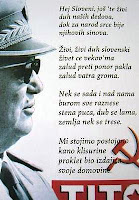Anton Pann on Stamp and Postal Stationary Envelope
 Anton Pann is generally believed to have authored the music to Deşteaptă-te, române!, Romania's national anthem. His associate Gheorghe Ucenescu is known to have arranged the melody to the lyrics of Andrei Mureşanu, but Pann's direct implication in the creative process was allegedly not confirmed by sources. According to one account, Ucenescu had used a romanza composed by Pann in 1839, in turn complimenting the lyrics of Grigore Alexandrescu. It has also been argued that the music was that of a popular lied (German song), and first published in one of Pann's manele collections. The ethnographic research carried out by Dimitrie Gusti confirmed that the same melody was being sung as a folk song by Southern Dobrujan ethnic Turks in the 1930s.
Anton Pann is generally believed to have authored the music to Deşteaptă-te, române!, Romania's national anthem. His associate Gheorghe Ucenescu is known to have arranged the melody to the lyrics of Andrei Mureşanu, but Pann's direct implication in the creative process was allegedly not confirmed by sources. According to one account, Ucenescu had used a romanza composed by Pann in 1839, in turn complimenting the lyrics of Grigore Alexandrescu. It has also been argued that the music was that of a popular lied (German song), and first published in one of Pann's manele collections. The ethnographic research carried out by Dimitrie Gusti confirmed that the same melody was being sung as a folk song by Southern Dobrujan ethnic Turks in the 1930s.
Mihai Eminescu, one of Romania's most influential poets, made a reference to Pann in his poem Epigonii (1870), which, in its opening verses, traces the development of early literat ure and the impact of Romanticism. Cited alongside Dimitrie Cantemir, Dimitrie Ţichindeal, Vasile Cârlova, Ienăchiţă Văcărescu, Alexandru Sihleanu, Ion Heliade Rădulescu, Cezar Bolliac and others, Pann is referred to as the son of Pepelea, the witty hero of folk literature, and complimented with the words "as clever as a proverb". During the interwar period, the works of Anton Pann were reflected and complimented in the modernist poetic art of Ion Barbu. Barbu's Nastratin Hogea la Isarlâk uses Pann's main character to tragic effect, depicting, in willing contrast to the proverbial setting, Nastratin's violent self-sacrifice. George Călinescu noted that Pann's "mix of buffoonery and seriousness" present in the works of poet Tudor Arghezi, came "in the line of Anton Pann".
ure and the impact of Romanticism. Cited alongside Dimitrie Cantemir, Dimitrie Ţichindeal, Vasile Cârlova, Ienăchiţă Văcărescu, Alexandru Sihleanu, Ion Heliade Rădulescu, Cezar Bolliac and others, Pann is referred to as the son of Pepelea, the witty hero of folk literature, and complimented with the words "as clever as a proverb". During the interwar period, the works of Anton Pann were reflected and complimented in the modernist poetic art of Ion Barbu. Barbu's Nastratin Hogea la Isarlâk uses Pann's main character to tragic effect, depicting, in willing contrast to the proverbial setting, Nastratin's violent self-sacrifice. George Călinescu noted that Pann's "mix of buffoonery and seriousness" present in the works of poet Tudor Arghezi, came "in the line of Anton Pann".
 ure and the impact of Romanticism. Cited alongside Dimitrie Cantemir, Dimitrie Ţichindeal, Vasile Cârlova, Ienăchiţă Văcărescu, Alexandru Sihleanu, Ion Heliade Rădulescu, Cezar Bolliac and others, Pann is referred to as the son of Pepelea, the witty hero of folk literature, and complimented with the words "as clever as a proverb". During the interwar period, the works of Anton Pann were reflected and complimented in the modernist poetic art of Ion Barbu. Barbu's Nastratin Hogea la Isarlâk uses Pann's main character to tragic effect, depicting, in willing contrast to the proverbial setting, Nastratin's violent self-sacrifice. George Călinescu noted that Pann's "mix of buffoonery and seriousness" present in the works of poet Tudor Arghezi, came "in the line of Anton Pann".
ure and the impact of Romanticism. Cited alongside Dimitrie Cantemir, Dimitrie Ţichindeal, Vasile Cârlova, Ienăchiţă Văcărescu, Alexandru Sihleanu, Ion Heliade Rădulescu, Cezar Bolliac and others, Pann is referred to as the son of Pepelea, the witty hero of folk literature, and complimented with the words "as clever as a proverb". During the interwar period, the works of Anton Pann were reflected and complimented in the modernist poetic art of Ion Barbu. Barbu's Nastratin Hogea la Isarlâk uses Pann's main character to tragic effect, depicting, in willing contrast to the proverbial setting, Nastratin's violent self-sacrifice. George Călinescu noted that Pann's "mix of buffoonery and seriousness" present in the works of poet Tudor Arghezi, came "in the line of Anton Pann". 





